This article is a part of the Sustainability Series, a new column focusing on sustainability, low-waste living, and minimalistic practices that we can implement as individuals to help make our planet just a little less miserable.
Adopting a zero waste lifestyle amidst a fast-paced pandemic world couldn’t get any more challenging! This article provides a quick list of highly recommended resources in and around Seattle that can help simplify zero waste living.
Though it may seem overwhelming at first, the key is to take it slow and start with what you can.
Where and how to grocery shop
Food, personal care, and household products are such a big deal because we consume them every single day.
I highly recommend visiting Litterless to see a comprehensive list of bulk, low-waste, and local grocery stores in Washington state.
These stores have a wide selection of goods that are organic, fair-trade, local, ethically and sustainably sourced, and package-free or come with compostable/recyclable packaging; most of them also accept reusable containers. Additionally, many shops include options for both brick-and-mortar and online shopping.
So, plan your grocery list, prepare clean containers or bags, and hit the store (or shop online)!
Here are some of my top picks from Litterless of stores I personally shop from:
Scoop Marketplace (Kirkland, Renton, online)
Instagram: @scoopmarketplace
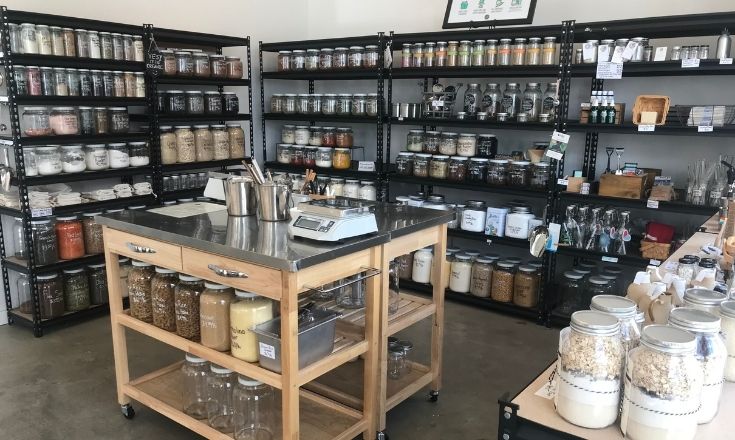
For those who can afford investments in buying large quantities of bulk food and have space to store them, Scoop Marketplace is the perfect choice for you!
Become a member to receive product discounts and buy yourself loads of bulk food. My advice is to focus on staple pantry foods such as oats, rice, nuts, ect., because these will save you a lot of money in the long run.
I love that most bulk products come in their original manufacturing paper bag; some others come in plastic bags, like dried cranberries or dates, which are also packed by the original manufacturer.
This is important to mention because getting big bulk products in plastic bags from the vendor is far better than the store repacking the product with new packaging material. Using a new package, eco-friendly or not, requires new resources to be used. So, why not optimize the old package already in use, right?
Green Stuff (podcast): Listen to Stephanie Lentz, Scoop founder, talk about her mission, zero-waste tips, and conversations about waste with special guests in the same field. She makes a low-waste lifestyle so approachable, practical, and fun!
Out of the Box Eco-Store (Greater Eastside, online)
Instagram: @outoftheboxecostore
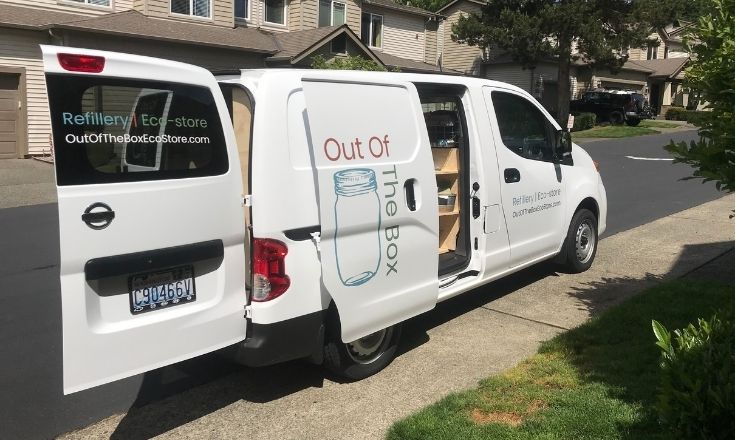
Out of the Box Eco-Store is a zero-waste grocery store — but on wheels!
If you live in the Greater Eastside area (Bellevue, Redmond, Sammamish, Issaquah, and Mercer Island) or Snoqualmie Valley, try shopping at Out of the Box today. Deliverable products range from household cleaning, personal care, to compostable and reusable products.
Aline Bloch, the founder, will come and refill products for you. All you have to do after booking a visit is prepare your clean containers, leave them in front of your home, and then collect them after they have been refilled, painless and wasteless.
Recently, Bloch announced that Out of the Box will be opening a brick-and-mortar store at Issaquah Work Lofts for refill shopping, pickups, and workshops. Stay tuned for more updates on their website.
Watch my shopping experience with Out of the Box here.
Eco Collective (Ballard, online)
Instagram: @ecocollective_
Eco Collective, an online wellness brand, has really nice self-care products. One of my favorites from them is the shea butter lotion, which I have found works well on my face and body as a moisturizer. The lotion texture is thick and absorbs quickly; it comes in a glass mason jar, lasts several months, and pricing is also fairly reasonable.
Central Co-op (Seattle, Tacoma, online)
Instagram: @central_coop
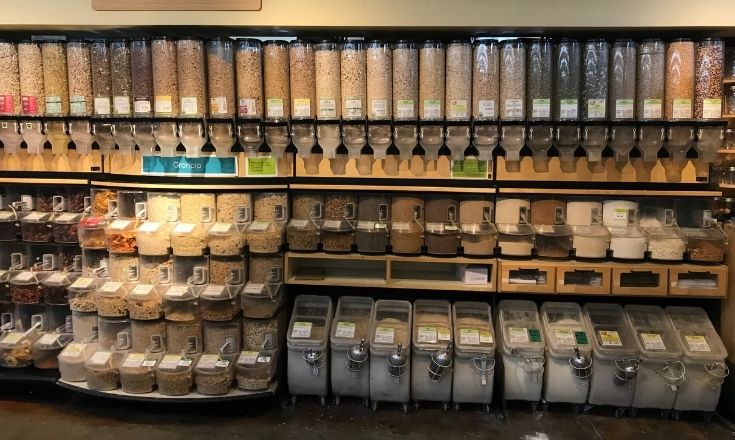
When I lived in the U District, I sometimes visited the Central Co-op Seattle location. It was this store that first introduced me to the whole bulk shopping experience.
It’s pure joy, to be honest. Central Co-op has endless selections of bulk food, a decent amount of bulk household liquids, and oh — bulk soap bars! Never in my life had I ever shopped for soap by slicing it from a gigantic block and putting it in my own Ziplock bag, but it’s super fun!
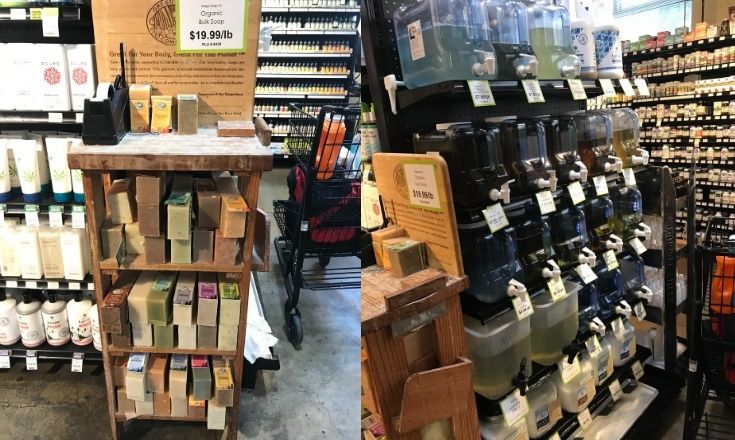
Bulk shopping always reminds me to consume less, as for example, when I wanted to try out different kinds of granola. It was a long commute by bus and all of it combined would be very heavy. It would often feel like carrying a big fridge with me on my way home from the store.
Dispose and recycle properly
Another importance in trying to reduce waste is knowing how to dispose, recycle, and compost it properly. The following tools will help you just that.
King County Garbage & Recycling Services
Visit the Seattle Public Utilities website, select the right category of waste (garbage/yard waste/etc.) and enter your city. You’ll see general information on how to handle your waste correctly. To find out what to do with specific stuff like appliances or electronics, use this tool: “What do I do with…?”
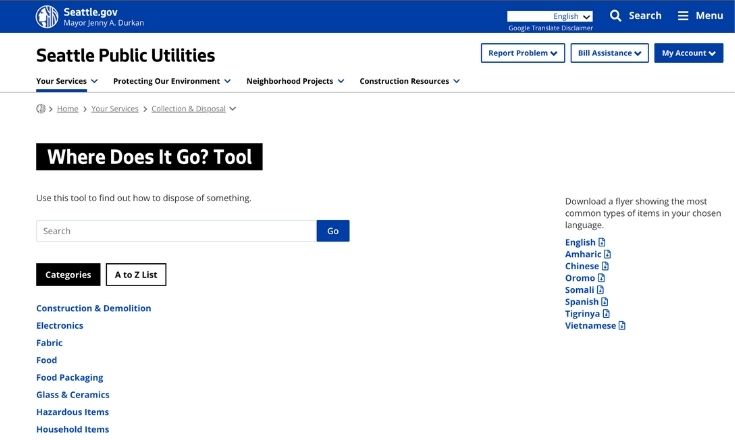
Seattle Public Utilities Where does it go? Tool: This is specific to Seattle. When in doubt about proper disposal, use this tool. Search with keywords or use quick links below the search bar.
Learn about sustainable and zero-waste policies
Zero Waste Washington
Instagram: @zerowastewashington
Zero Waste Washington is a nonprofit, tax-exempt, charitable organization that focuses on driving policy changes related to waste. For example, one of the policies that moved forward this year is that restaurants and food service businesses must make disposable utensils and packaging contingent on the affirmation of customers.
Check out more of their impactful work here and support where you can.
Educate yourself and read the news
Crosscut – Environment
Instagram: @crosscut
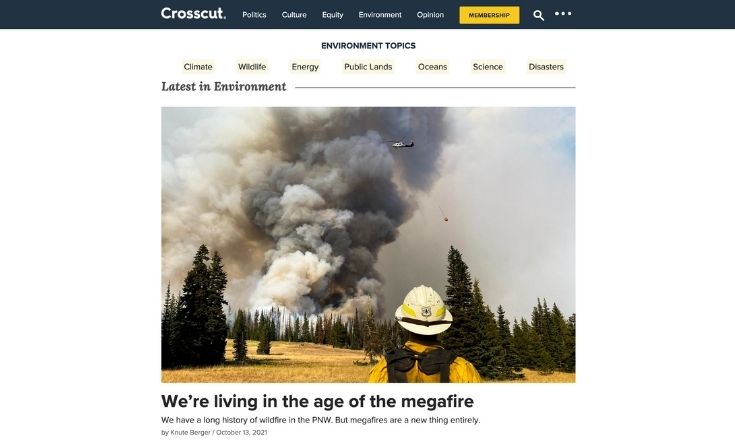
Crosscut is a Pacific Northwest nonprofit news organization. Stories covered are curated, written well, and are specific to where we live.
Check out these articles: “Covering climate change means watching the Washington you love fade away” and listen to their podcast, “Crosscut Escapes,” to learn about “How Mount Rainier will tell us when it’s going to blow.”
Connect with the zero waste community
Seattle Zero Waste Facebook group
Instagram: @seattlezerowaste
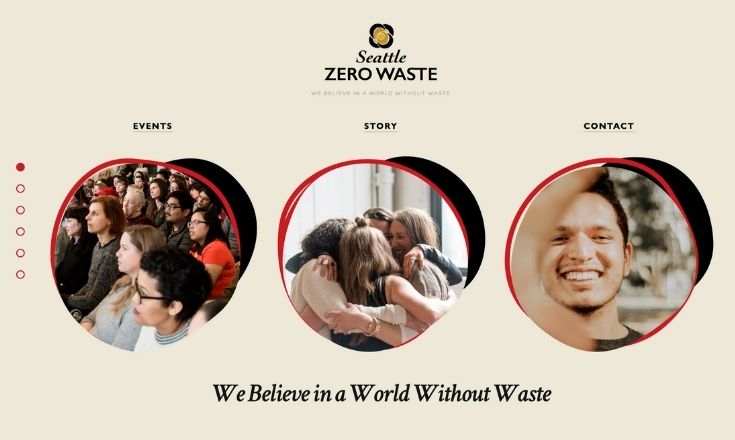
Attend free monthly meetings (currently virtual) to hear updates about the latest zero waste legislation, low-waste tips, eco-friendly local businesses, or to simply connect with people in the field.
I recommend signing up for the email newsletter on their website so you don’t miss a chance to join the meetings. The next meeting is on Oct. 20 from 7-8 p.m., where you can hear from Seattle Public Utilities staff about holiday leftovers and waste.
Give yourself grace
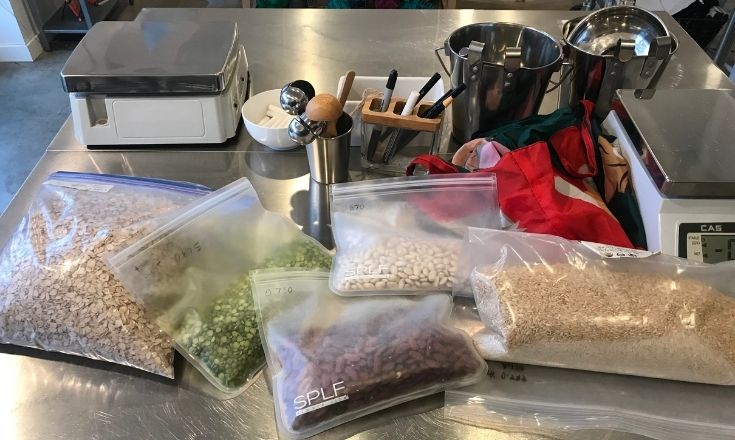
Speaking from years of experience in practicing low-waste living, I’m far from doing it perfectly in all aspects of my life.
When I focused too much on reducing waste in every decision I made, I not only stressed myself out, but also others around me. That’s why I stepped back and approached it again, but this time, slower and calmer.
As a result, my new habits are more sustainable and make me happier. I remind myself that I live in an economic system that was not designed with sustainability in mind.
We live within a consumerist society that pushes and prods us to buy more and then hands us the responsibility as individuals to make less waste ourselves.
It’s a messy, broken system to begin with.
The fastest, most effective way to deal with waste issues is through government policies and regulations on corporations, which takes time. Therefore, as individuals, let’s focus on some simpler ways you can reduce waste as an individual and don’t feel guilty about the rest.
As Anne-Marie Bonneau, a zero-waste chef, once said: “We don’t need a handful of people doing zero waste perfectly. We need millions of people doing it imperfectly. ”
Save this list and share it with your friends and family. If you have any great low-waste resources that you would like to add to this list, email me at gift.homsaen@seattlecollegian.com.
Author

Gift is a Programming AAS-T student and a Web Manager Consultant at the Seattle Collegian. She defines herself as a minimalist, who enjoys living low-waste and makes websites. Her goal is to create more awareness around sustainability in web design and how each of us can reduce carbon footprint as an individual. She enjoys improving the Collegian website as much as writing, baking, and making oat milk. Check out her website!












Be First to Comment